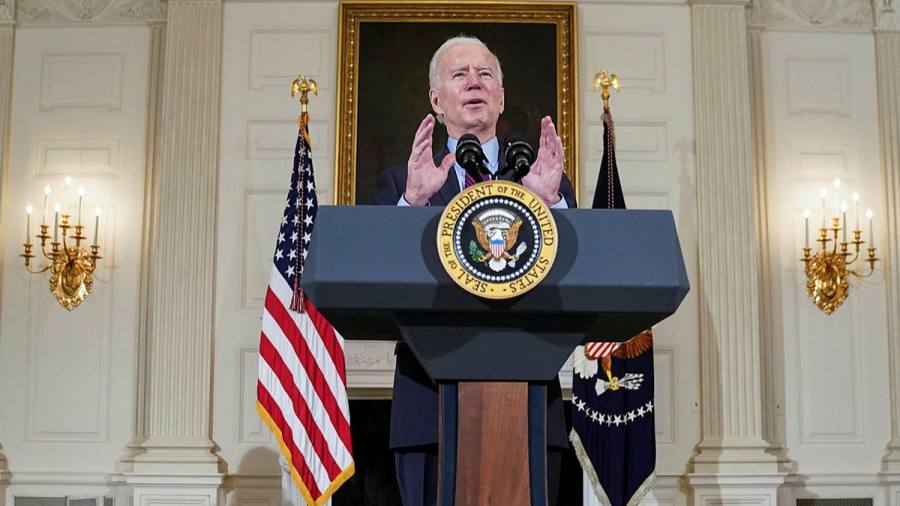[ad_1]
The writer is a portfolio manager at Odey Asset Management
Governments have a long list of things they need to do. Most cost a lot of money. Recovering from the pandemic, dealing with climate change and “levelling up†society are all essential, but very expensive, objectives. Currently, many governments are financing themselves through central bank printing presses. This cannot continue indefinitely without compromising the ability of central banks to keep inflation at an acceptable level.
Soon, governments will have to choose between losing control of inflation or giving up their policy objectives. Both are unpalatable choices that can lead to social disquiet. In the US and the UK there is an obvious solution: a wealth tax.
According to the US Federal Reserve, the wealthiest 10 per cent of American households had a net worth of $80.7tn in the third quarter of 2020 — just under 70 per cent of total US household wealth. The top 10 per cent net wealth was equivalent to 375 per cent of gross domestic product in the same period, and it has never been less than 200 per cent of GDP in the past 30 years.
A one-off 5 per cent wealth tax on the top 10 per cent would raise $4.03tn, or 19 per cent of current GDP. This would have reduced the richest decile’s net worth in the third quarter last year to $76.7tn. They would have been 2.1 per cent better off than a year earlier, rather than 7.5 per cent better off without the tax. Such a tax might well comfortably pay for the Biden administration’s plans over the next couple of years. It would reverse part of the long-term increase in wealth inequality and it would immediately lift the burden of financing the government from the central bank.
The tax would redistribute wealth away from a sector of society which by virtue of its size can only consume so much, stimulating the economy. This would help financial markets return to their economic function of price discovery and efficient capital allocation, free from the distorting hand of the Federal Reserve. It would help remove the need for zero interest rates and quantitative easing, policies that have helped promote the ailments currently afflicting the economy, such as widening inequality, cycles of speculative bubbles and busts, rising debt levels and declining productivity growth.
It’s popular, too. A Reuters/Ipsos poll in January 2020 found that 64 per cent of respondents favoured a wealth tax, with 77 per cent of Democrats and 53 per cent of Republicans in favour. Unquestionably, the owners of financial assets have enjoyed windfall gains over the past decade, courtesy of QE and low interest rates. There is, therefore, a strong moral argument of basic fairness behind a wealth tax.
In the UK, the Office for National Statistics reported that in 2018, the wealthiest 10 per cent had aggregate net wealth of £6.5tn, just over 300 per cent of GDP. A 1 per cent net wealth tax on the richest 10 per cent would theoretically yield revenues equivalent to 3 per cent of GDP, comparable with a 3.7 per cent of GDP yield in the US.
The diversification of UK wealth across asset classes complicates the implementation of a tax on the richest decile, with just 21.5 per cent of their wealth in directly held financial assets and a further 43.7 per cent in pensions. However, it is plausible that the data understate the true net worth of the UK’s richest. The inclusion of assets held offshore, particularly in tax havens, would probably produce much greater levels of taxable wealth.
A one-off windfall tax of 5 per cent on just the richest 1 per cent of UK households could yield revenues equivalent to up to 7.9 per cent of GDP. Meanwhile, a 1 per cent annual tax would produce revenues equivalent to up to 1.6 per cent of GDP each year. In comparison, increasing UK corporation tax from 19 per cent to 24 per cent would theoretically raise an extra £14.5bn, equivalent to about 0.7 per cent of current GDP.
Anaesthetised by a long period of low inflation, financial markets are mostly convinced that expanding fiscal deficits will not lead to notably higher inflation. This judgment may prove incorrect. The US economy has potential sources of immediate demand derived from the latest fiscal packages and excess household savings. The US has also just witnessed the fastest growth of the money supply on record.
If an inflationary shock is combined with continued deficit monetisation, a lurch into a self-sustaining inflation spiral becomes probable. Wealth taxes can provide a route out of this conundrum. Given the variability of asset returns, a one-off wealth tax is most likely fairer than an annual tax. The introduction of one on the richest citizens is a potential game-changer, an exit from a debt monetisation road that ultimately leads to economic hell. Politically, we may have to turn left to avoid it.
[ad_2]






